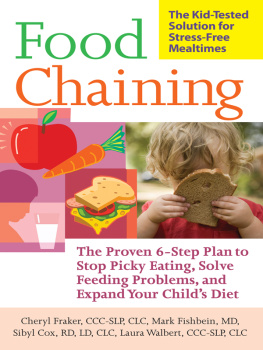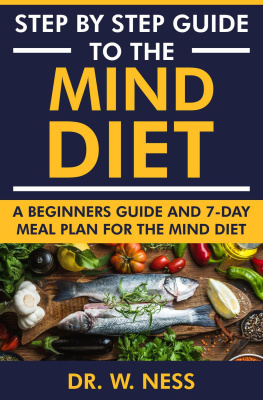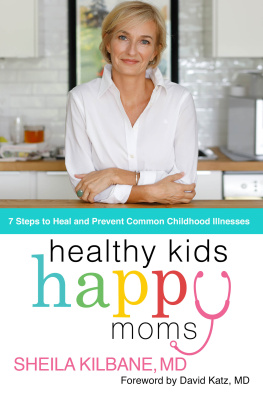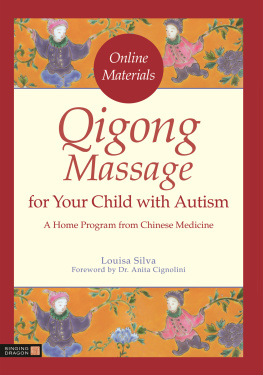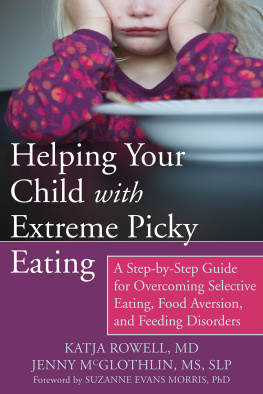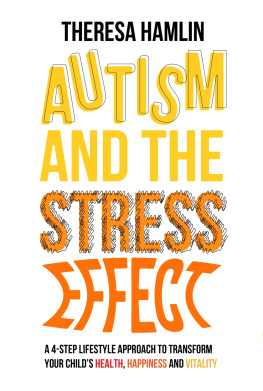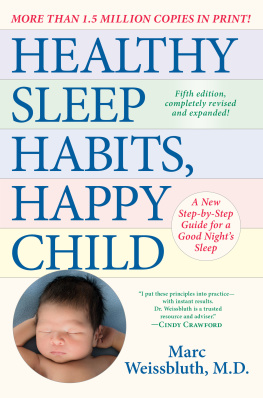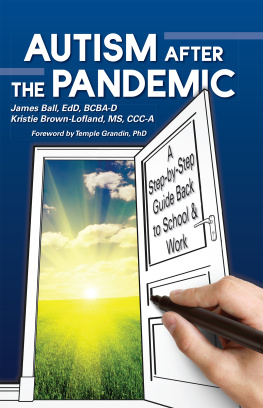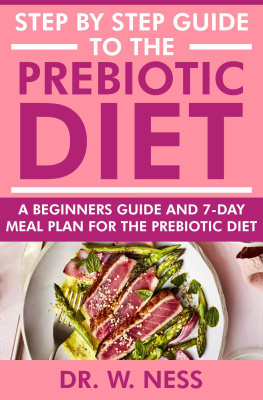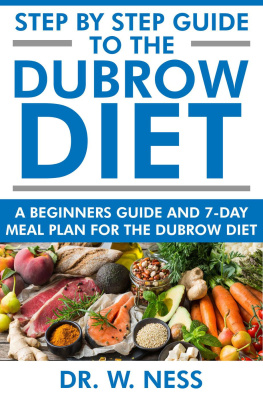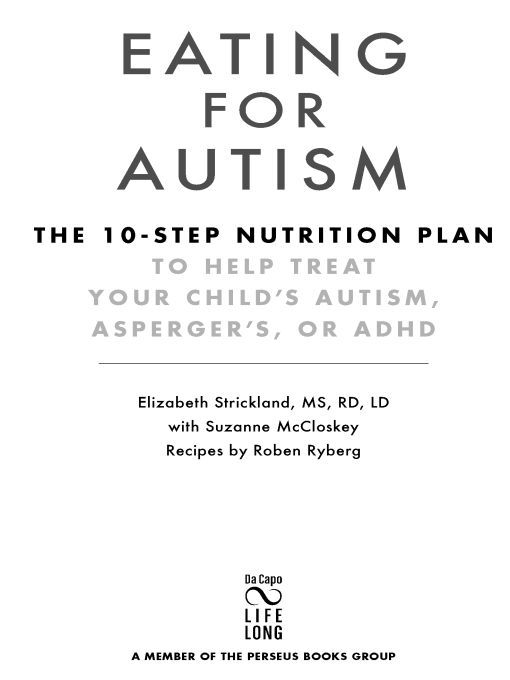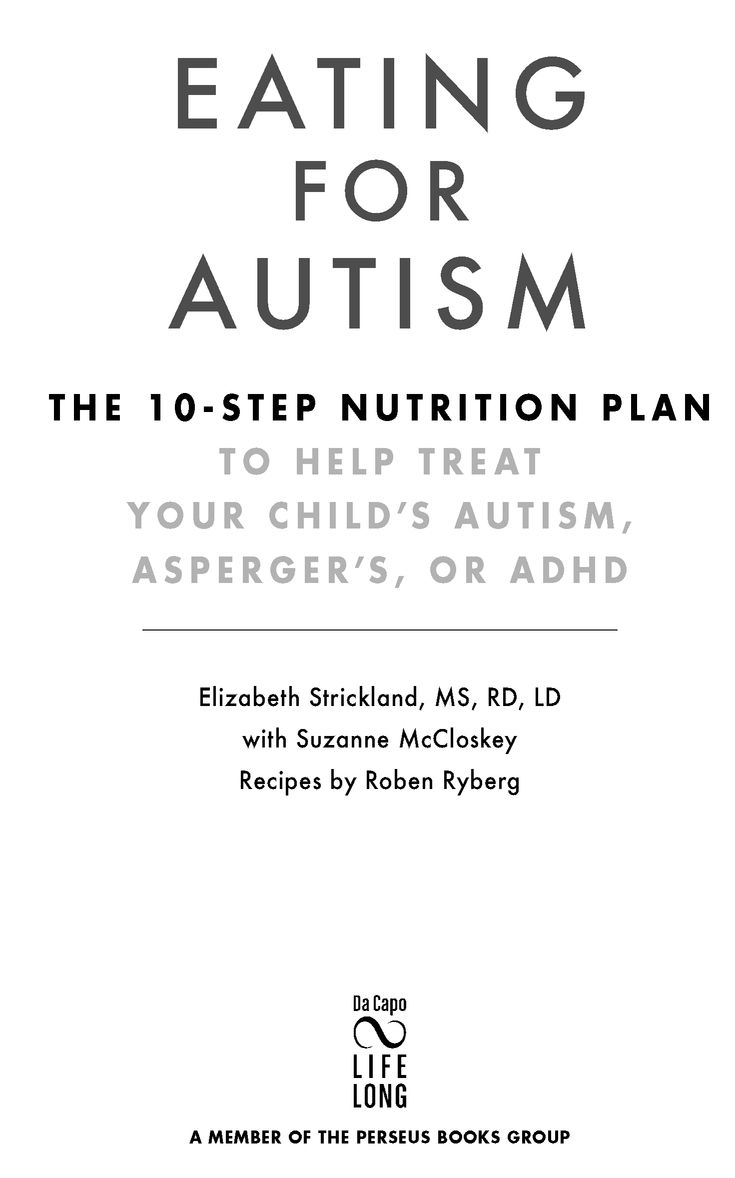Table of Contents
This book is dedicated to my children Jacob, Jessica, and Jackson.
I carry each of you in my heart. Thanks for sharing your mom
over the years and making it possible for me to
help so many other children.
PREFACE
Since earning my bachelors degree in dietetics and my masters degree in nutrition twenty-five years ago, Ive spent my professional career providing nutrition therapy to children who suffer from all kinds of health issuesfrom developmental disabilities, metabolic disorders, and gastrointestinal disorders to food allergies, feeding problems, and chronic illness. During this time, Ive seen a dramatic and encouraging shift in the publics perception of nutrition. People are taking more personal responsibility for their health and the health of their children. Parents are becoming increasingly proactive about safeguarding their childrens health. They are questioning the overuse of medication and searching for safer, effective, natural alternatives. Theyre beginning to understand that healthy foods, nutrients, vitamins, minerals, antioxidants, amino acids, essential fatty acids, herbs, and nutraceuticals play a huge role in maintaining their childrens health and supporting their ability to heal.
Now the bad newsIve also seen an alarming increase in the rate of many serious health conditions, such as autism, Attention Deficit Disorder (ADD), Attention Deficit Hyperactivity Disorder (ADHD), learning disabilities, asthma, food allergies, and obesity in our children. Twenty-five years ago, autism was rare; now 1 in 150 children are diagnosed with the disorder. ADD and ADHD are sweeping the country, with more than 2 million children diagnosed. Between 5 and 10 percent of schoolchildren are diagnosed with learning disabilities. Asthma is reaching epidemic proportions, affecting more than 6 percent of kids in the United States. More than 12 million children and adults suffer from food allergies, and the numbers continue to rise.
I was particularly moved by the rising rate of autism in our kids, and about fifteen years ago, I began to focus my practice on treating kids with the condition, as well as related disorders such as Aspergers Syndrome, Pervasive Developmental Disorder-Not Otherwise Specified (PDD-NOS), ADD, and ADHD. First identified in 1943 by Dr. Leo Kanner of Johns Hopkins University, autism remains the most puzzling childhood disorder. To this day, no one knows what causes autism, how best to treat it, and why some kids recover while others do not. This means that treating autism is literally like putting together the pieces of a puzzle. There is no cookie cutter approach. Every child is unique and responds to a different variety of treatment approaches. Therefore its critical that you work together with your childs medical team to create the most effective combination of therapies for your child.
Treatment of autism typically includes medication, special education services, behavioral programs, occupational therapy, sensory integration therapy, speech-language therapy, complementary and alternative medicine (CAM), biomedical treatment, and numerous other therapies such as art, music, and hippotherapy. However, too often theres one critical element missingnutrition therapy.
The right nutritional interventions can have a huge impact on your childs brain function, memory, learning, attention, focus, mood, behavior, growth, and overall health. Nutrition can protect your childs body from neurotoxins, enhance his immune system, and support his gastrointestinal function. Unfortunately, many physicians and other healthcare professionals dont recognize the importance of nutrition therapy in treating autism and even discourage parents from pursuing nutritional interventions. I believe this happens in large part because of the false claims that have been made that a special diet or nutritional supplement can cure autism or create miraculous recoveries. I also think part of the problem lies in the massive amount of controversial and questionable information about nutritional interventions used to treat autism found on the Internet. Sadly, there are many unqualified people out there claiming to be nutritionists who provide parents with misinformation, false claims, and testimonials and sell them all kinds of ineffective and costly nutritional supplements.
The truth is, no diet or supplement will miraculously cure autism. However, you can use food, supplements, herbs, and nutraceuticals to feed your autistic childs starving brain and body and maximize his brain function, which will make him more responsive to other treatments and therapies. Nutrition is the basis upon which all other treatments are built, and nutrition therapy should be a part of every autistic childs comprehensive treatment plan.
I wrote this book because I want to help both parents and professionals better understand the role of nutrition therapy in treating autism, Aspergers, PDD-NOS, ADD, and ADHD. Unlike other books on these conditions, which dedicate at best one chapter to nutritional interventions, Eating for Autism is focused solely on nutrition. Ive spent many years treating hundreds of children with these conditions, and Ive gained a very clear understanding of parents concerns, questions, and specific needs for help regarding nutrition. Eating for Autism is specifically designed for:
Parents who are seeking guidance in making informed decisions about safe and effective nutritional interventions for their children. Its my hope that this book will help you separate fact from fiction with regard to the information on nutritional interventions found on the Internet and suggested by some practitioners. I encourage you to use this book when discussing nutritional interventions with your childs physician, dietitian, educators, and other healthcare professionals.
Registered dietitians who are seeking to enhance their clinical skills in providing nutrition therapy to children with autism. Theres new and controversial information about nutrition interventions constantly emerging in the autism community. Dietitians are obligated to research and evaluate new proposed nutritional interventions and provide families with reliable information so they can make safe, responsible decisions regarding diets, supplements, and nutrition therapy for their children.
Physicians who would like to know more about the critical role nutrition therapy plays in the comprehensive treatment of autism. When physicians emphasize the role that nutrition plays in enhancing a childs brain and body function, it encourages parents to take good nutrition more seriously. Physicians can also refer parents to a registered dietitian who specializes in developmental disabilities.
Educators who are seeking a broader understanding of how nutrition impacts childrens cognitive function and their ability to learn in the classroom. Its critical for educators to understand how certain foods, food additives, and nutrient deficiencies contribute to behavioral problems, hyperactivity, inattentiveness, and poor classroom performance. Nutritional interventions can help children with autism benefit from their special education services and should be considered in the educational system.
Other healthcare professionals who want to understand why nutrition therapy is an important component to treating autism. If an autistic child is nutritionally compromised, it will negatively impact his ability to respond to other treatment approaches, such as behavioral programs and art, music, hippo-, occupational, sensory integration, and speech-language therapies. All therapists involved in treating autism should advocate for the inclusion of nutrition therapy, so these children are better able to benefit from their treatment approaches.


